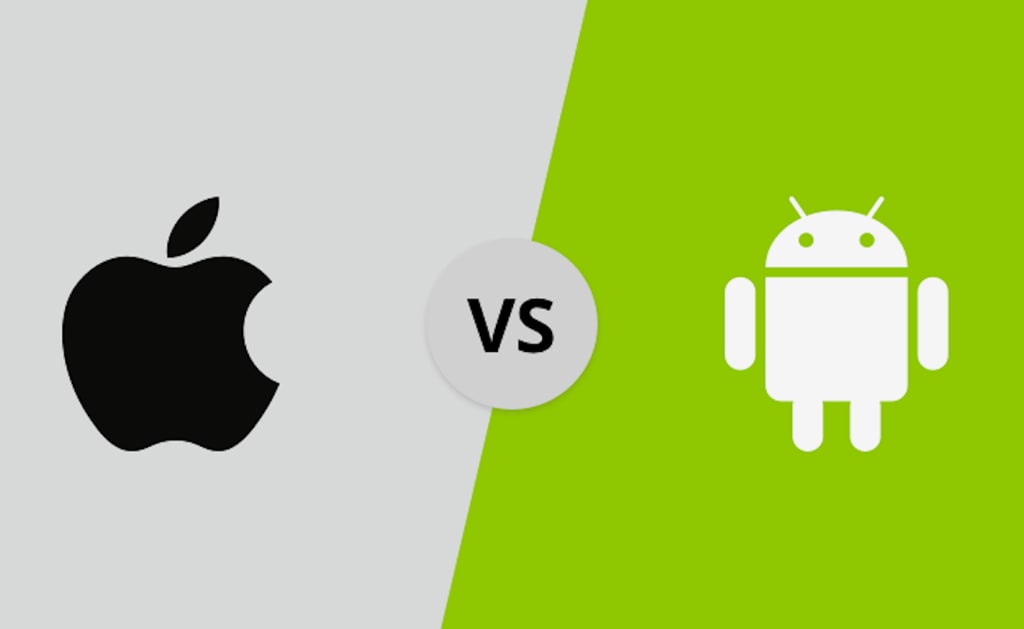Android vs Iphone
Google’s Android and Apple’s iOS are the only two operating systems used in smartphones and tablets today.

Google's Android and Apple's iOS are operating systems used primarily in mobile technology, such as smartphones and tablets. Android, which is Linux-based and partly open source, is more PC-like than iOS, in that its interface and basic features are generally more customizable from top to bottom. However, iOS' uniform design elements are sometimes seen as being more user-friendly.
You should choose your smartphone and tablet systems carefully, as switching from iOS to Android or vice versa will require you to buy apps again in the Google Play or Apple App Store. Android is now the world’s most commonly used smartphone platform and is used by many different phone manufacturers. iOS is only used on Apple devices, such as the iPhone.
iOS and Android both use touch interfaces that have a lot in common - swiping, tapping and pinch-and-zoom. Both operating systems boot to a homescreen, which is similar to a computer desktop. While an iOS home screen only contains rows of app icons, Android allows the use of widgets, which display auto-updating information such as weather and email. The iOS user interface features a dock where users can pin their most frequently used applications.
A status bar runs across the top on both iOS and Android, offering information such the time, WiFi or cell signal, and battery life; on Android the status bar also shows the number of newly received emails, messages and reminders.
A comparison of some of the features of the Android 11 and iOS 14 is here. Android 11 highlights include:
Many different manufacturers make Android phones and they often include some customization over the vanilla Android experience. e.g. HTC Sense or Samsung TouchWiz. Depending upon your device and carrier, there may be pre-installed apps that are bundled with your Android device.
This is one area where iOS users have a massive advantage. iOS upgrades are generally available to all iOS devices. When Apple release iOS 14 in the fall of 2020, it was made available for iPhone models as old as the iPhone 6S, which was released in Sep 2015. Apple cites hardware capability as the reason some older devices may not receive all new features in an upgrade.
Although Google does update Android frequently, some users may find that they do not receive the updates on their phone, or even purchase phones with out-of-date software. Phone manufacturers decide whether and when to offer software upgrades. They may not offer an upgrade to the latest version of Android for all the phones and tablets in their product line. Even when an upgrade is offered, it is usually several months after the new version of Android has been released.
Android gets apps from Google Play, which currently has 600,000 apps available, most of which will run on tablets. However, some Android devices, such as the Kindle Fire, use separate app stores that have a smaller selection of apps available. Many originally iOS-only apps are now available for Android, including Instagram and Pinterest, and Google’s more open app-store means other exclusive apps are also available, including Adobe Flash Player and BitTorrent. Android also offers access to Google-based apps, such as Youtube and Google Docs.
The Apple app store currently offers over 1 million apps, about 30% of which are available for the iPad. Most developers prefer to develop games for iOS before they develop for Android. A list of iOS-only games is maintained here on Wikipedia.
The bottomline when comparing Google and Apple's app stores is that most popular apps are available for both platforms. But for tablets, there are more apps designed specifically for the iPad while Android tablet apps are often scaled up versions of Android smartphone apps. Developers at startups often focus on one platform (usually iOS) when they first launch their smartphone app because they do not have resources to serve multiple platforms from the get go. For example, Instagram started with iOS and their Android app came much later.
A wide variety of Android devices are available at many different price points, sizes and hardware capabilities.
iOS is only available on Apple devices: the iPhone as a phone, the iPad as a tablet, and the iPod Touch as an MP3 player. These tend to be more expensive than equivalent hardware using Android.
Android apps are programmed using C, C++ and Java. It is an "open" platform; anyone can download the Android source code and Android SDK for free. Anyone can create and distribute Android apps for free; users are free to download apps from outside the official Google Play store. There is, however, a one-time $25 registration fee for developers who want to publish their apps (whether free or paid apps) on the official Google Play store. Apps published on Google Play undergo a review by Google. The Android SDK is available for all platforms - Mac, PC and Linux.
iOS apps are programmed using Objective-C. Developers must pay $99 every year for access to the iOS SDK and the right to publish in Apple's app store. The iOS SDK is only available for the Mac platform.
Some app development platforms - such as Titanium Appcelerator and PhoneGap - offer a way to code once (say in Javascript and/or HTML) and have the platform convert it into "native" code for both Android and iOS platforms.
Several prominent people have shifted from iPhone to Android. Android's connection to the Google ecosystem of services is strong and arguably more useful compared with Apple's cloud services suite.
About the Creator
Enjoyed the story? Support the Creator.
Subscribe for free to receive all their stories in your feed. You could also pledge your support or give them a one-off tip, letting them know you appreciate their work.





Comments
There are no comments for this story
Be the first to respond and start the conversation.